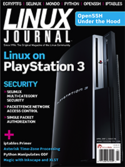Linux Journal Article Posted - Single Packet Authorization
04 March, 2007

 For the April security issue of the Linux Journal,
I have written the first of a two-part article
on the concept of Single Packet Authorization (SPA). The first installment lays a theoretical
foundation for why the security architecture and capabilities of SPA are superior to
Port Knocking. The second installment (to be published in
May) will provide a hands-on examination of how to use fwknop to harden an
OpenSSH server behind a default-drop iptables policy. Here is an excerpt from the article:
For the April security issue of the Linux Journal,
I have written the first of a two-part article
on the concept of Single Packet Authorization (SPA). The first installment lays a theoretical
foundation for why the security architecture and capabilities of SPA are superior to
Port Knocking. The second installment (to be published in
May) will provide a hands-on examination of how to use fwknop to harden an
OpenSSH server behind a default-drop iptables policy. Here is an excerpt from the article:
 "...When an attacker is on the prowl in an attempt to exploit a vulnerability in server software (as
opposed to client software), the first step is reconnaissance; the attacker needs to locate a target.
This process has been brilliantly automated by Nmap, so it is easy to construct a list of target systems
that may be ripe for compromise. If the attacker has found a zero-day vulnerability in server software
that you happen to be running, you don't want to appear in this list of targets! Both port knocking
and Single Packet Authorization use a packet filter configured in a default-drop stance and
simultaneously provide service only to those IP addresses that can prove their identity via a passive
mechanism. No TCP/IP stack access is required to authenticate remote IP addresses via this passive
means. Nmap cannot even tell that a server is running when protected in this way, and it does not
matter even if the attacker has a zero-day exploit..."
"...When an attacker is on the prowl in an attempt to exploit a vulnerability in server software (as
opposed to client software), the first step is reconnaissance; the attacker needs to locate a target.
This process has been brilliantly automated by Nmap, so it is easy to construct a list of target systems
that may be ripe for compromise. If the attacker has found a zero-day vulnerability in server software
that you happen to be running, you don't want to appear in this list of targets! Both port knocking
and Single Packet Authorization use a packet filter configured in a default-drop stance and
simultaneously provide service only to those IP addresses that can prove their identity via a passive
mechanism. No TCP/IP stack access is required to authenticate remote IP addresses via this passive
means. Nmap cannot even tell that a server is running when protected in this way, and it does not
matter even if the attacker has a zero-day exploit..."




